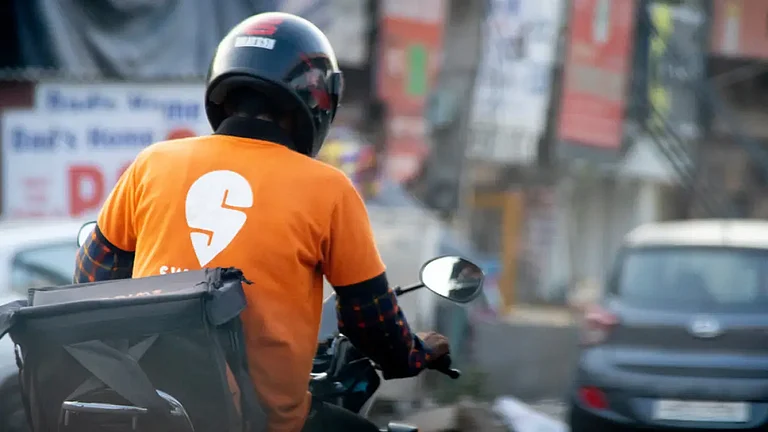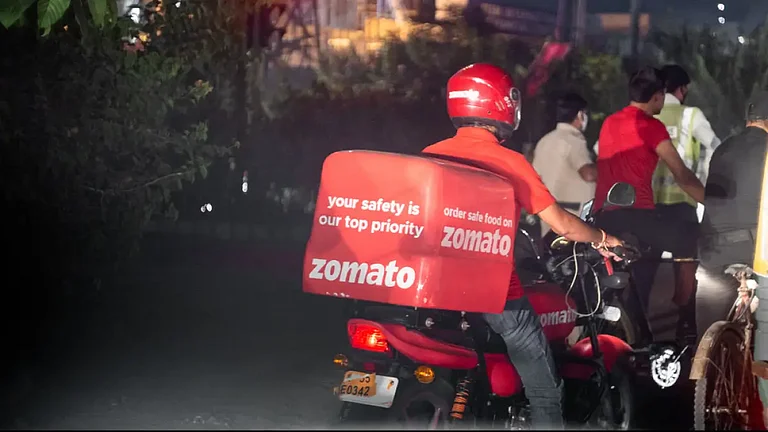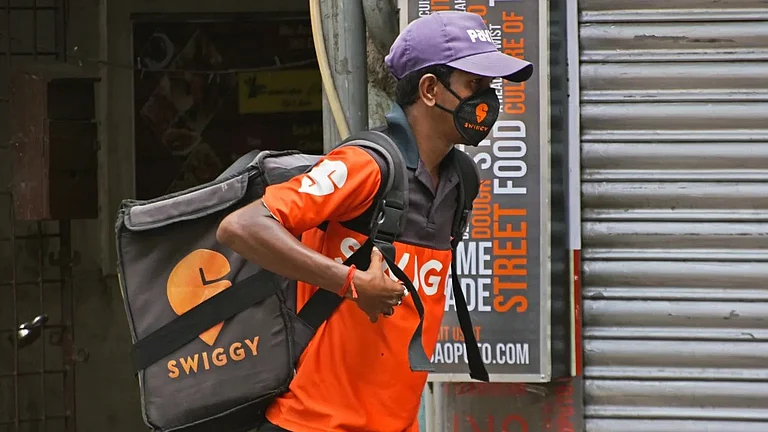Fair wages, job security, social protection, weather-friendly working conditions, and a lot more ---- these are basic necessities for a worker to work anywhere. But does every worker receive such must-haves at their workplaces. Unfortunately, the answer is no. The gig economy continues to expand with the rising number of quick commerce and cab-hailing platforms in India, so too does the debate around the working conditions of gig workers.
Why Blinkit Delivery Workers Are Protesting in Varanasi? The Latest Gig Workers Debate Explained
The long-standing debate over gig workers' rights has resurfaced after over 150 Blinkit delivery partners in Varanasi went on strike, demanding better pay, summer-friendly uniforms, and humane work conditions
The prolonged discussion, which seems to have settled down after the central government announced health cover for gig workers, have again caught attention. This time, Blinkit workers reignited the debate. More than 150 gig workers working with Zomato’s quick commerce arm went on strike in Uttar Pradesh’s Varanasi this weekend. They protested against low pay, poor working conditions, and the lack of summer-appropriate uniforms.
The Gig and Platform Services Workers Union (GIPSWU) shared various videos showing Blinkit workers protesting in Varanasi. In the video, the protestors were seen in their trademark yellow uniforms, holding a placard urging the quick commerce giant to end what they describe as “harassment of delivery riders”.
What Blinkit Riders Are Demanding?
Speaking to Deccan Herald, Gig and Platform Services Workers Union National Coordinator Nirmal Gorana stated that the protestors were calling for an end to mandatory 12 to 4 pm working hours, a higher minimum wage, cotton uniforms, and access to basic facilities such as drinking water, shaded waiting areas, etc.
As the protest videos went viral on social media platforms, a Reddit user who claims to have worked for food delivery giant Zomato revealed that the company provides incentives on the basis of delivery time and the number of deliveries a gig worker completes.
He also explained why Blinkit workers are demanding the end of mandatory working shifts. “Day shift incentives are more (500 for dinner’s 350) but order delivery required is more (27 for dinner's 17 ). Two shifts are mandatory, 3+ hours in 12 to 4pm shift and 8pm to 10pm, to be eligible for day shift incentives,” his post read.
How Blinkit Responded?
The quick commerce platform responded to gig workers’ demands, but it looks harsh. Blinkit allegedly blocked their IDs and forced them to sign an agreement to have their accounts reinstated. In short, it took a punitive measure for their two-day strike and suspended 150 delivery partners, the report said.
In addition, the demonstrators were also asked to record a video showing documents in their hands and declaring their agreement to its contents. The gig workers union, on X (formerly Twitter), said that a company representative even threatened the striking workers with police action and demanded they sign affidavits vowing to never strike again.
Later, the union informed that Blinkit started unlocking IDs on Monday, but there are still 50 workers whose IDs remain blocked.
When Gig Worker Debate Began?
The debate began with the beginning of 2025. Comedian Kunal Kamra targeted quick commerce platforms for the social security and welfare of gig workers, while highlighting problems they face in the 10-minute delivery process --- unfair wages and long working hours.
“While we enjoy the convenience of quick commerce, I’d like my first tweet of 2025 to be about the dark side. Platform owners exploit gig workers & they aren’t job creators. They are landlords without owning any land,” Kamra wrote on X at the time when Blinkit CEO Albinder Dhindsa was live-tweeting the new record orders created by Zomato’s quick commerce arm.
He directly asked Dhindsa, “Can you enlighten us with data on the average wages you paid your Delivery Partners in 2024?” Kamra also pointed out the issue of “Lack of transparency” in the hiring process of gig workers.
What Zomato Claims Its Giving Gig Workers?
Soon after the debate started, Zomato CEO Deepinder Goyal shared the data regarding the earnings and benefits of the company’s delivery partners. He revealed that delivery partners working at least eight hours per day earned an average monthly income of approximately Rs 28,000 in 2024.
Even after accounting for estimated fuel costs (around Rs 5,000 per month), this income remains highly competitive compared to other opportunities available to gig workers.
And all delivery partners onboarded with Zomato are automatically covered under the company’s delivery partner insurance policy, which includes accident, death, and health coverage, among other benefits, he added.
What Govt Is Doing for Gig Workers?
In the Union Budget 2025, Finance Minister Nirmala Sitharaman announced significant measures to support gig workers in India. The government plans to provide gig workers with identity cards and register them on the e-Shram portal, facilitating their access to social security benefits.
The gig workers will also be covered under the PM Jan Arogya Yojana, granting them healthcare benefits with free treatment up to Rs 5 lakh. According to the government, these initiatives are expected to benefit nearly 1 crore gig workers across the country.




